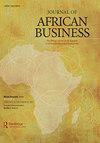供应链导向与供应链风险管理能力:乌干达农产品加工企业供应链绩效机制
IF 1.8
Q3 BUSINESS
引用次数: 1
摘要
摘要今天的农产品供应链变得越来越复杂,容易受到影响其绩效的风险的影响。然而,据报道,对农产品食品供应链绩效的研究有限。供应链导向(SCO)建立SCP的机制,尤其是在发展中经济体,人们对其了解较少。因此,本文探讨了上海合作组织与SCP之间的关系,并结合了供应链风险管理(SCRM)能力的中介作用。采用偏最小二乘结构方程模型对乌干达247家农产品加工企业的横断面调查数据进行了分析。研究结果表明,上合组织对SCP和SCRM能力都有积极而显著的影响。此外,SCRM能力在一定程度上调解了SCO和SCP之间的关系。这项研究的新颖性有两方面:首先,它在发展中国家农产品加工公司的独特背景下建立了上合组织和SCP之间的关系。其次,它揭示了SCRM能力的部分中介作用,从而解决了需要探索上合组织影响SCP的机制的空白。研究结果对乌干达和其他类似经济体的农产品加工公司的执业管理人员和其他相关利益相关者的基本启示是,关注上合组织可以改善SCP,但重要的是要进一步强调建立SCRM能力,将其作为最大化整体SCP的机制。本文章由计算机程序翻译,如有差异,请以英文原文为准。
Supply Chain Orientation and Supply Chain Risk Management Capabilities: Mechanisms for Supply Chain Performance of Agro-Food Processing Firms in Uganda
ABSTRACT Today’s agro-food supply chains have become increasingly complex and vulnerable to risks, which affect their performance. Nevertheless, research on agro-food supply chain performance (SCP) is reportedly limited. And the mechanism through which supply chain orientation (SCO) builds SCP, especially in developing economies is less understood. Therefore, this paper explores the relationship between SCO and SCP, and incorporates the mediating role of supply chain risk management (SCRM) capabilities. Cross-sectional survey data collected from 247 agro-food processing firms in Uganda are analyzed by using Partial Least Square Structural Equation Modeling. The findings reveal that SCO positively and significantly influences both SCP and SCRM capabilities. Furthermore, SCRM capabilities partially mediate in the relationship between SCO and SCP. The novelty of this research is twofold: First, it establishes the relationship between SCO and SCP in a unique context of agro-food processing firms in a developing country. Second, it reveals the partial mediating role of SCRM capabilities, thereby addressing the gap of the need to explore the mechanisms through which SCO influences SCP. The fundamental implication of the study findings for practicing managers and other relevant stakeholders in agro-food processing firms in Uganda and other contextually similar economies is that, a focus on SCO can improve SCP, but it is important to further emphasize building SCRM capabilities as mechanisms for maximizing the overall SCP.
求助全文
通过发布文献求助,成功后即可免费获取论文全文。
去求助
来源期刊

Journal of African Business
BUSINESS-
CiteScore
4.60
自引率
10.50%
发文量
36
期刊介绍:
Journal of African Business is the official journal of the Academy of African Business and Development, the largest network of professionals committed to advancement of business development in African nations. JAB strives to comprehensively cover all business disciplines by publishing high quality analytical, conceptual, and empirical articles that demonstrate a substantial contribution to the broad domain of African business. Regardless of the research context, tradition, approach, or philosophy, manuscripts submitted to JAB must demonstrate that the topics investigated are important to the understanding of business practices and the advancement of business knowledge in or with Africa. Particularly, JAB welcomes qualitative and quantitative research papers. JAB is not, however, limited to African-based empirical studies. It searches for various contributions, including those based on countries outside Africa that address issues relevant to African business. Targeted toward academics, policymakers, consultants, and executives, JAB features the latest theoretical developments and cutting-edge research that challenge established beliefs and paradigms and offer alternative ways to cope with the endless change in the business world. Covered areas: Accounting; Agribusiness Management and Policy; Business Law; Economics and Development Policy; Entrepreneurship and Family Business; Finance; Global Business; Human Resource Management; Information and Communications Technology (ICT); Labor Relations; Marketing; Management Information Systems (MIS); Non-Profit Management; Operations and Supply Chain Management; Organizational Behavior and Theory; Organizational Development; Service Management; Small Business Management; Social Responsibility and Ethics; Strategic Management Policy; Technology and Innovation Management; Tourism and Hospitality Management; Transportation and Logistics
 求助内容:
求助内容: 应助结果提醒方式:
应助结果提醒方式:


